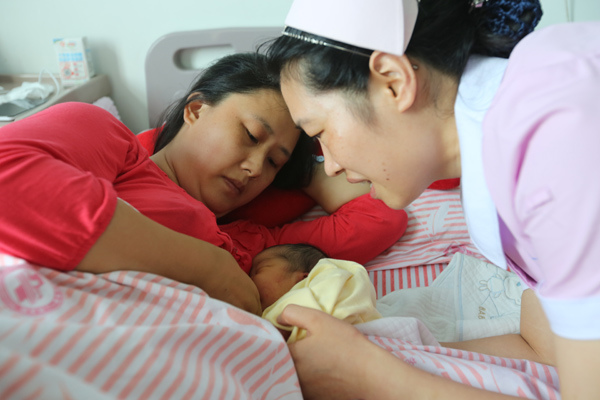
A nurse at a hospital in Xiangyang, Hubei province, helps Chen Jing to breast-feed her second child on Friday. (Photo: China Daily/Gong Bo)
About 20 million women in China are expected to have free operations to help them recover their fertility after the introduction of a policy encouraging all couples to have two children.
The "free-recovery" initiative was announced by the National Health and Family Planning Commission after the top legislature approved an amendment to the Population and Family Planning Law in late December.
The commission said in a statement on Jan 6 that the free surgery should be available to women who used long-term contraceptive measures — mainly intrauterine devices and tubal ligation, also known as tube tying — to help recover their fertility if they want a second child.
The move is expected to benefit about 20 million nationwide, according to Yuan Xin, a population studies expert at Nankai University in Tianjin who sits on the commission's panel of experts.
Long-term contraceptive measures, particularly the IUD, have been used widely in China to conform with family planning regulations. Official statistics show that about 54 percent of married women of childbearing age had IUDs fitted, and 26 percent underwent tubal ligation.
Ding Baorong, a staff member at Baqiao family planning bureau in Xi'an, Shaanxi province, said some women were willing to undergo the procedures but others were not.
In many places, couples faced problems in obtaining a hukou, or residence permit, for a child if the woman rejected the IUD.
Ding performed between 20 and 30 procedures a day for 10 years at the local family planning service center — mainly IUD implants and removal, tubal ligation and abortions.
Ding welcomed the free operations and suggested that they be extended to cover women past their reproductive prime.
"These women made a contribution to the family planning policy by heeding government calls to have IUDs or tubal ligation," she said.
Gao Lihong, a doctor at Jiaxing Maternity and Child Health Care Hospital in Zhejiang province, said IUDs usually have to be removed after five to 10 years of being implanted, due to the risk of infection.
From 1980 — when China adopted the one-child policy — to 2009, a total of 286 million IUD implants and 99 million tubal ligations were carried out in China, according to official records.
Yuan Xin said this trend is declining, particularly among women younger than 35.
To enable women to make informed choices about contraception, the central government has scrapped hukou barriers.
The amendment to the law states that a woman's choice of contraception must be respected. But it still recommends long-term methods for women who already have two children.
According to government estimates, 90 million women will become eligible to have a second child under the new policy.
About 80 percent of them are estimated to have had IUDs implanted or to have undergone tubal ligation, Yuan said.
China has about 270 million married women of childbearing age.
According to the National Health and Family Planning Commission, among the babies born last year, the number of first children dropped by 850,000 year-on-year, or by 4.1 percent. The number of second children born rose by 450,000.
To meet demand, many maternity hospitals began to set up second-child consultancy offices to help couples with professional advice.
Mei Li, an obstetrician-gynecologist at a district maternity hospital in Guangzhou, Guangdong province, said couples have been asking about the free operations to reverse long-term contraceptive procedures.
Starting in November, more women began seeking the procedures and 293 IUD removals were performed in December alone, a year-on-year increase of 51 percent, Mei said.
An IUD removal procedure normally takes between three and five minutes and costs several hundred yuan, with medical checkups required beforehand.
Mei dismissed as "a misunderstanding" the notion that IUDs can harm a woman's health. "It's been proven worldwide that they are safe and effective, and the services available at qualified hospitals are of a high standard," she said.
In contrast, aborting an unwanted pregnancy risks major problems arising such as menstrual irregularity, abdominal pain or infertility.


















































